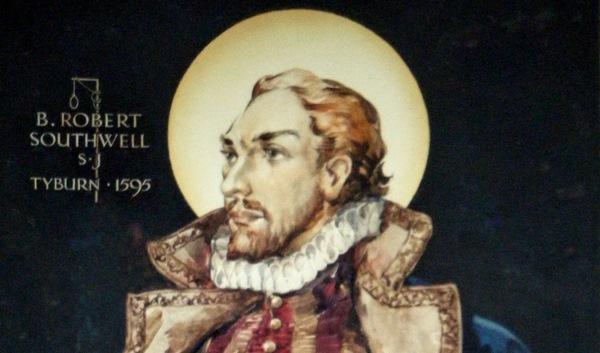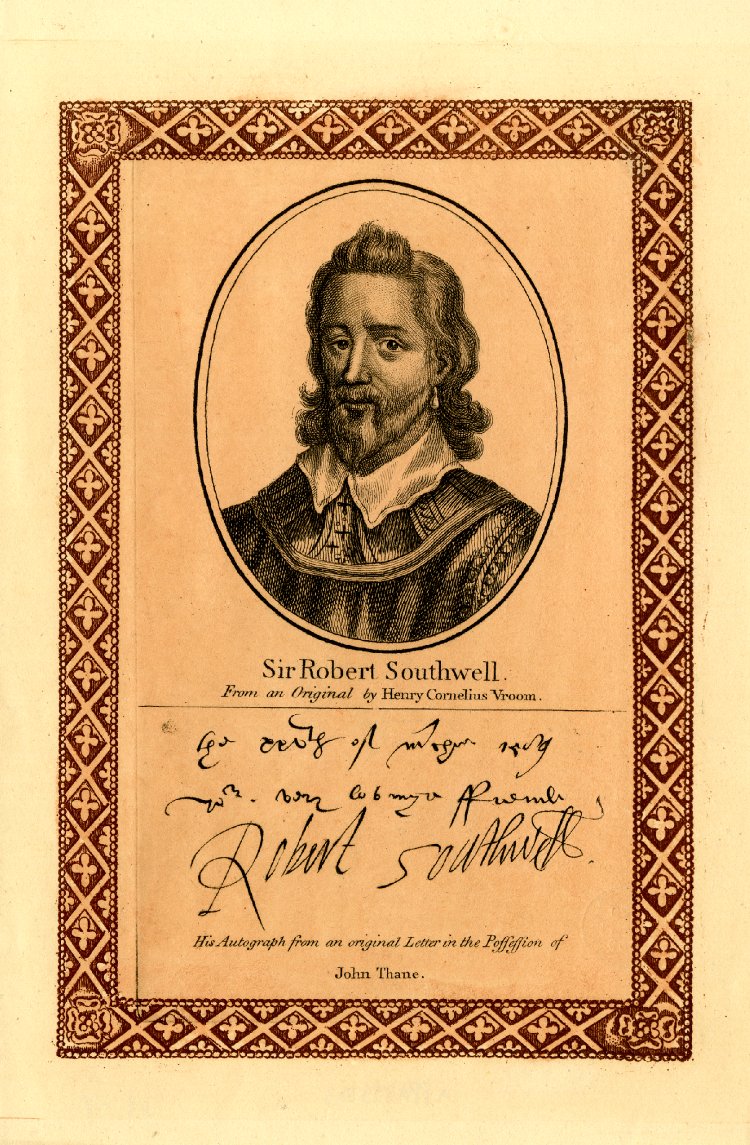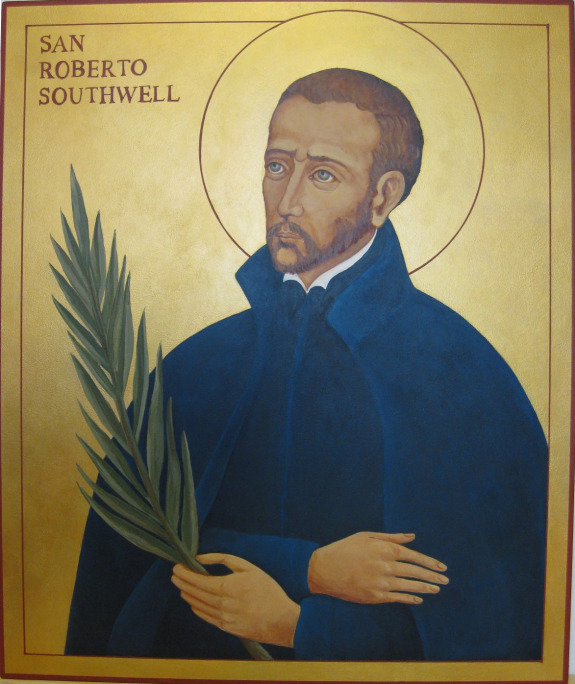Saint Robert Southwell, SJ
Born: Between Oct & Dec 1561
Died : February 21, 1595
Beatified: December 15, 1929
Canonised: October 25, 1970
 Fr Robert Southwell, a martyr of England, is one of the more illustrious English martyrs and one of its better poet. He was born of a well-to-do family at Horsham St Faith near Norwich. Since all the institutions of learning had become Protestant, Robert was sent to the English College at Douai, Flanders when he was fifteen. For a time he also studied under the Jesuit Thomas Darbyshire at the Clermont College in Paris. Before he was seventeen, Robert applied to the Society in Paris but was told he was too young and that the novitiate was temporarily closed because of military activity. Robert was so determined to become a Jesuit that he walked all the way to Rome and was accepted and began his novitiate at Sant’ Andrea in Oct 1578. After completing his philosophy and theological studies at the Roman College, he was ordained in 1584. After spending two years at the English College in Rome, his prayer to be assigned to the English mission was answered and he left Rome together with Fr Henry Garnet in May 1586.
Fr Robert Southwell, a martyr of England, is one of the more illustrious English martyrs and one of its better poet. He was born of a well-to-do family at Horsham St Faith near Norwich. Since all the institutions of learning had become Protestant, Robert was sent to the English College at Douai, Flanders when he was fifteen. For a time he also studied under the Jesuit Thomas Darbyshire at the Clermont College in Paris. Before he was seventeen, Robert applied to the Society in Paris but was told he was too young and that the novitiate was temporarily closed because of military activity. Robert was so determined to become a Jesuit that he walked all the way to Rome and was accepted and began his novitiate at Sant’ Andrea in Oct 1578. After completing his philosophy and theological studies at the Roman College, he was ordained in 1584. After spending two years at the English College in Rome, his prayer to be assigned to the English mission was answered and he left Rome together with Fr Henry Garnet in May 1586.
 To avoid capture by port authorities who were on the lookout for incoming priests, Frs Southwell and Garnet landed on a secluded coast a mile east of Folkestone and made their way separately to London. There Fr Southwell was assigned to minister in and around London, whereas Fr Garnet was assigned the Midlands counties. There he helped priests who had just arrived in England, ensuring that they had housing and to direct them to the counties where they could go about their work. Fr Southwell visited the city’s prisons and frequently ministered in the neighbouring counties and it was only after Fr Garnet was made superior of the mission that Fr Southwell was able to visit the outlying counties, preaching and administering the sacraments to the faithful. Later when the Jesuits established a secret press in London, the sole source of religious literature for English Catholics, Fr Southwell helped direct the printing of Catholic catechisms and devotional books. His letters to Sir Philip Howard, husband of the Countess of Arundel, who was imprisoned in London Tower for his faith were later published as An Epistle of Comfort, which is one of the finest prose works of the Elizabethan age.
To avoid capture by port authorities who were on the lookout for incoming priests, Frs Southwell and Garnet landed on a secluded coast a mile east of Folkestone and made their way separately to London. There Fr Southwell was assigned to minister in and around London, whereas Fr Garnet was assigned the Midlands counties. There he helped priests who had just arrived in England, ensuring that they had housing and to direct them to the counties where they could go about their work. Fr Southwell visited the city’s prisons and frequently ministered in the neighbouring counties and it was only after Fr Garnet was made superior of the mission that Fr Southwell was able to visit the outlying counties, preaching and administering the sacraments to the faithful. Later when the Jesuits established a secret press in London, the sole source of religious literature for English Catholics, Fr Southwell helped direct the printing of Catholic catechisms and devotional books. His letters to Sir Philip Howard, husband of the Countess of Arundel, who was imprisoned in London Tower for his faith were later published as An Epistle of Comfort, which is one of the finest prose works of the Elizabethan age.
Fr Southwell’s active ministry lasted six years, during which time he had several close escapes from determined priest-hunters. His ministry ended in June 1592 when he was betrayed by a Catholic girl, Anne Bellamy, whose family he had known. She was asked by Richard Topcliffe, the professional priest-hunter to convince Fr Southwell to come to their residence one evening. Thinking that the girl wanted to receive the sacraments, he went only to be arrested by Topcliffe and his men, who viewed the priest as their greatest prize as they expected to learn the names and locations of all priests working in England. Fr Southwell was bound in chains and brought to Topcliffe’s residence which had its own private torture chamber. It was only after two excruciating days of torture that Topcliffe learnt that Fr Southwell was a Jesuit who came to England to preach the Catholic faith and was ready to die for that cause as he was not prepared to reveal a single name. After thirteen times of torture and knowing that that the priest would not divulge any information, the officials finally gave up, leaving him to face cold, hunger and thirst in the paupers’ prison.

It was at the paupers’ prison that Fr Southwell’s father visited him and seeing him covered in vermin and looking like a corpse, he sent a petition to the queen stating that “If his son had done anything worthy of death, then let it be death; but if not, let him be treated as the gentleman he is.” At the queen’s request Fr Southwell was moved to the Tower, where his father supplied him with necessities and Fr Garnet sent him his breviary and Bible and the countess sent him a copy of St Bernard’s sermons. It was during his long years in prison that Fr Southwell expressed his thoughts and feelings in poems and these became popular after his martyrdom. They were collected and published as St Peter’s Compliant which was very well received by Catholics.
After two and a half years in the Tower, without visitors and cut off from all communication, Fr Southwell sent a message to Lord Burghley requesting for trial or be permitted visitors or be released. Soon after, his trial began and although Fr Southwell denied having plotted against the queen and that he came to England as a priest to administer sacraments to those who desired them, he was nevertheless found guilty of high treason. When the jailer came the next morning to tell him that he would be executed that same day, Fr Southwell told him that he could not have received more joyful news. He was tied and dragged to Tyburn, a journey of three hours. Just before his execution, he said his final prayer, “Into your hands, O Lord, I commend my spirit,” and the cart was drawn from him. After he was hanged, his head was cut off and placed on a bridge and his body quartered and exhibited on four city gates.
Fr Southwell was thirty-four at his death. He was beatified by Pope Pius XI on Dec 15, 1929 and was canonized by Pope Paul VI on Oct 25, 1970.
